Thanks for your support! If you make a purchase using our links in this article, we may make a commission. And, as an Amazon Associate, I earn from qualifying purchases. See the full disclosure here.
Mexico has lots to offer but often gets avoided when it comes to travel. The number one reason for this is safety. So is it safe to drive your RV in Mexico?
RVs give you the freedom to roam where ever your heart desires, this is why so many people choose to join the RV life. Before travel to any foreign country, safety should always be considered.

Mexico has so many things to offer, warm weather, beautiful beaches, delicious food, and tons of history. It shouldn’t be a surprise that it ranks consistently in the Top 10 visited countries in the world and welcomes approximately 50 million tourists a year.
Many people experience Mexico by flying into the country and using guided tour transportation. Or, tourists oftentimes stay at resorts where they will stay for their time in the country.
This is common and for the most part, considered “safe” by most. But what about driving an RV into Mexico and traveling alone while navigating the country yourself, is it still safe?
Let’s take a little trip south of the border!
Crossing the Border Into Mexico in Your RV
Every country has its own requirements upon entry. Preparation with documentation and travel plans at the border will help ease the process. Entering by land requires a trip through a manned border crossing and a stop at immigration.
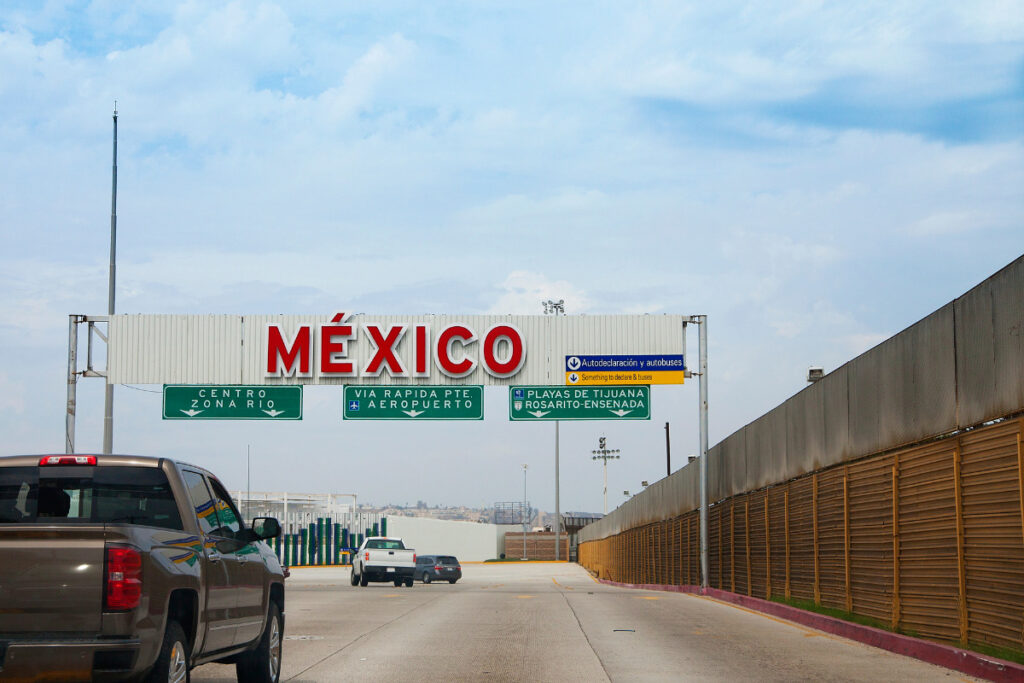
Can You Cross the Border in an RV?
Can you cross the border into Mexico in an RV? Yes!
Can you cross the border in your RV? Maybe.
Despite what you may have heard, Mexico does have rules to follow. Sure stop signs are a suggestion and speed limits are approximate but they do have some regulations when it comes to vehicle weight and size. These vary from state to state, so before you head out you should familiarise yourself with the local regulations. This is especially important if you have a 1-ton truck pulling your RV.
Crossing the border with an RV into Mexico is no different than doing it with a passenger vehicle. In general, here’s what you need to cross with your RV:
- Mexican auto insurance
- Temporary Vehicle Imporation Permit (commonly referred to as a “TIP”)
- Tourist Permit or “FMM” – remember it is YOUR responsibility to stop and get your FMM
- Vehicle registration and in some cases, a letter from your vehicle(s) lender stating you have permission to take it to Mexico
Do I Need a Passport to RV in Mexico?
Yep! Proving your citizenship with a valid passport is a requirement.
When you get to the border you will have to fill out a tourist visa which is usually valid for 180 days. The requirements are that you have to be able to prove you’re legally traveling while in the country with a passport and tourist visa. Upon exit, you will need to return some documents back to immigration.
It is also a good idea to have copies of your ID. You always want to be able to identify yourself.
Can I Travel with my Pets in an RV in Mexico?
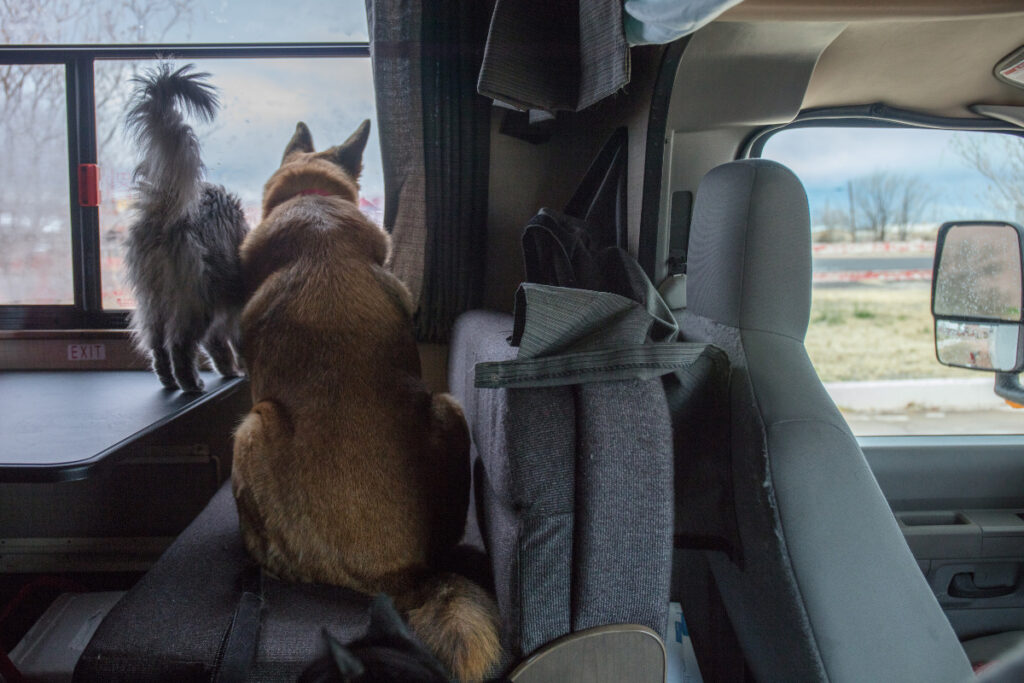
So you and your RV can travel to Mexico but what about your pets? Pets are allowed to cross the border with you in your RV. Although not common, checks may be performed to ensure they are in good health by officials.
As of 2019, dogs and cats no longer require a health certificate to enter Mexico. As long as your pet has no obvious health issues that would be cause for concern from an agent they will be good to go.
Although no longer a requirement, it’s not a bad idea to have your furry friends checked out by your vet before the big trip. Carrying a health certificate for your pet could save a hassle should anyone at the border suspect any health issues.
If you have a pet other than a cat or dog, it is best to check with Mexican authorities about transporting them across the border. Birds and small animals such as ferrets are allowed but do require extra documentation.
Once in Mexico, it is very pet-friendly. Many places allow pets and you shouldn’t often find yourself inconvenienced. Mexico is notorious for having a large number of stray dogs and even pet dogs that run loose on the streets. It’s best with unknown dogs to be cautious about things like ticks/fleas/lice, kennel cough, and other transmittable diseases (like rabies).
This should go without saying but Mexico is hot so have water available and don’t leave your pets unattended!
Can You Take an RV Rental From the US Into Mexico?
Providing they have the proper paperwork, rental vehicles are allowed to cross the border into Mexico.
RVs are no different. There should be no issue from the border official with the crossing providing you have the proper registration and Mexican insurance.
Not all car rental companies allow cross-border travel and each RV rental company will have its own policies. It is important that any rental company is aware of your plans to cross the border.
As of this writing, none of the large US or Canadian RV rental companies allow their RV rentals to cross into Mexico. Another option is to inquire with a peer-to-peer RV rental company and make arrangements with the RV owner.
Can You Rent an RV in Mexico?
Maybe you would rather fly to Mexico or cross in your own passenger vehicle and rent an RV to explore when you get there.
If this is your plan you are likely going to be dealing with private parties perhaps friends who live or are traveling in Mexico. There are currently no RV rental companies in Mexico that we could find.
There are some RVs for rent in Mexico through Facebook and local rental sites. The vast majority being stationary RVs that are set up on sites and not for travel.
Do I Need Special RV Insurance in Mexico?
RV insurance in Mexico is similar to that in the rest of North America. There is no special Mexico RV insurance. The vehicles must have a valid Mexican insurance policy which is very similar to your current policies.
In general, for motorhomes and camper vans you will have a policy for that vehicle similar to what you currently have but with coverage for Mexico. For RVs being towed, they can be covered under your tow vehicles coverage for liability only with no coverage for the towed RV. Or, you can have coverage for damage and theft to the towed RV while hitched and additional coverage available for damage and theft when unhitched.
The good news is that insurance in Mexico is relatively inexpensive. You can buy it online before you cross the border. Keep in mind that you typically need to purchase your policy at least 24 hours before you cross. Here are three recommended insurance companies: Cross Border Coverage, BajaBound, Lewis & Lewis, and MexPro.
When you take your vehicle to Mexico, you need to keep enough insurance coverage in place to maintain the vehicle’s legal registration in your home country.
– Mexexperience
Will my Health Insurance Cover Me in Mexico?
A big concern for most people traveling to Mexico is health insurance. Rightfully so, you do not want to be in a foreign country and have a medical emergency with no coverage.
For most people, any government health care or employer insurance plan will not cover you in Mexico. You may have options with your current private provider for additional coverage in Mexico.
In the majority of cases, you will have to purchase travel insurance for your time in Mexico. Depending on your age and health history travel insurance is very reasonable and worth the cost.
After Crossing the Border Into Mexico with an RV
Now that you’ve crossed the border, it’s fiesta time!

Does Mexico Have RV Parks?
Now that you are across the border you are going to need someplace to stay.
Mexico doesn’t have thousands of RV parks like the US and you won’t find any KOA resorts. That being said, there are RV parks in Mexico for both short-term and long-term stays. However, there is no great resource for a complete list of parks.
Parks open and close frequently so it’s best to contact them before travel. Online ex-pat groups and forums can be a great resource as well. For some parks, you might find them on CampgroundReviews.
Some of the parks are very basic without amenities like pools and dumping stations, rather providing more or less a place to park with hookups.
Long-term parks are often full of ex-pats who have been there for a while and with the growing popularity, they are often full (and pricey). These parks generally have more comforts and conveniences. Many allow RVs to be covered with palapas and additions like outdoor kitchens.
The Baja California peninsula has parks scattered from the border all the way down the coast. Mainland Mexico has fewer RV parks that are stretched over a much larger area.
It is a good idea to have a surge protector as electricity in many parts of Mexico can be unreliable, dropping and surging in voltage.
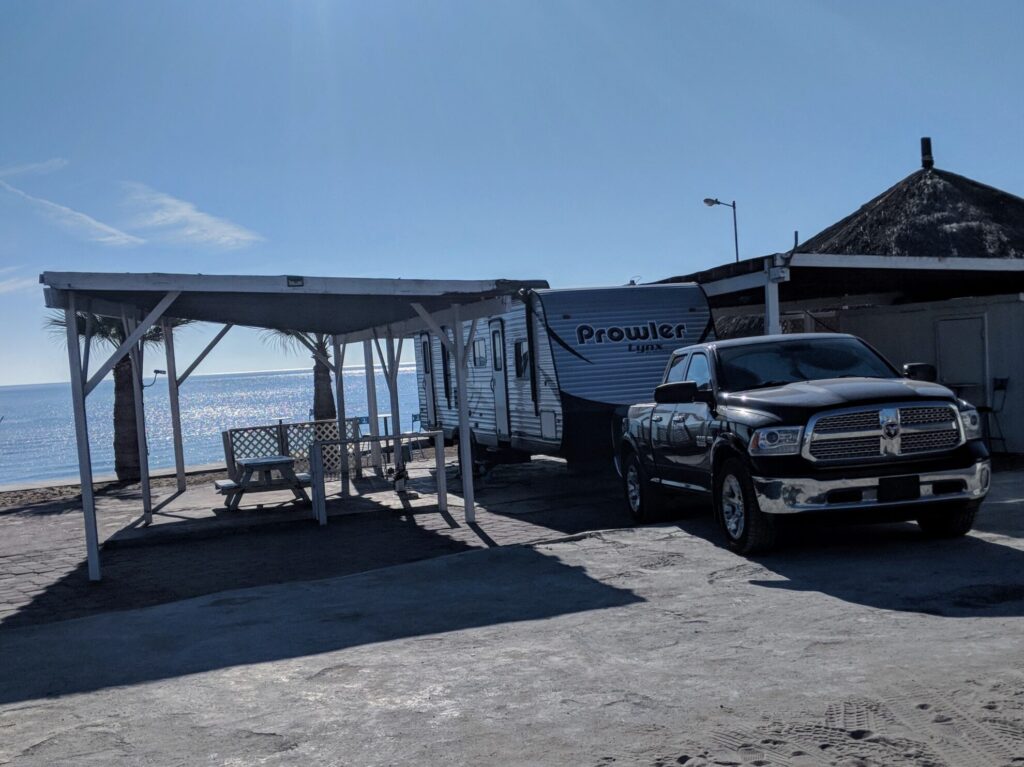
Can You Live Full-Time in an RV in Mexico?
In short, yes, absolutely you can live full-time in an RV. I am doing it right now. That being said, there is more to it than just parking and staying…
Full-time RV living has become a very popular life choice and is steadily increasing. Living full-time in your RV comes with some challenges, the main one being where your RV will be parked. Whether for one night or long term, you need a place to stay.
Mexico will present this same challenge, however, there are no Mexican laws specifically to deter RV living. Privately owned properties such as stores, gas stations, and hotels have their own rules regarding RV parking. Most people’s experiences seem to be that as a whole Mexico is accommodating to RVers.
A great option is a park allowing full-time RVers. These can be hard to find as, with most warm destinations, lots of people have the same idea. Restrictions on where an RV can be used for a dwelling are often an issue in Canada and the US. In Mexico however, far fewer restrictions exist making private or rented land a good option as well.
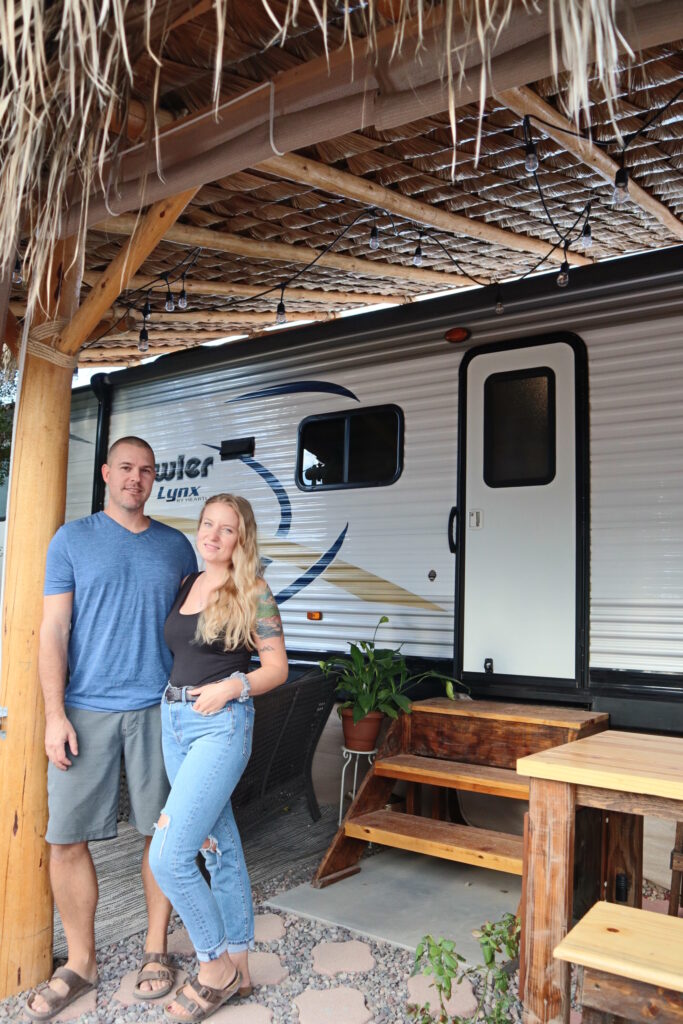
Considerations for Full-Time RV Living in Mexico
Some people imagine parking their RV on a white sand beach and living there. Although this is an option for sure many of the beaches are patrolled and do have hours of use. Especially right now, most beaches are closed for overnight camping.
Two major considerations with living full-time in Mexico are weather and more weather. Mexico is hot, that’s why so many people love it. Temperatures vary depending on what part of the country you are in but most of the country is hot and/or humid.
In Baja, the climate is very dry however temperatures can be extreme especially for the summer months. Air conditioning in an RV is a must! This should be considered if you will be boondocking; do you have a power source to run an AC on a consistent basis?
Other parts of the country can be very humid which we all know can reak havoc on RVs. Again, having a way to keep humidity down will be required.
The other weather consideration is storms. Tropical storms and hurricanes are common in Mexico especially near the coasts where most people will choose to travel and live.
Having a location that protects your RV in these situations is advisable. A generator is something to consider as well because power outages are common in Mexico.
Living in an RV with no AC in August in Mexico is no fun! Take it from someone who’s done it.
Where are the Safest Places to RV in Mexico?
Mexico is a big country with many cities and towns to explore and travel through. Like any location, there are areas better to avoid if possible.
RVing in Mexico is very popular and so caravans leave the US on a regular basis. This can be a great way to explore with the comfort of having a large group and maybe even some people who have traveled there before.
Your comfort level will determine where you feel safe. Many ex-pat locations such as Lake Chapala, Puerto Vallarta, Oaxaca, Merida, Playa del Carmen, San Miguel de Allende, and most of Baja will have the comfort of foreigners like yourself and more English speaking locals. For many, this gives a sense of safety. Larger locations with a dense ex-pat population and money can also draw more petty crime.
Small rural towns may feel unsafe due to the lack of law enforcement and “all eyes on you” feeling but can be some of the safest and most memorable spots.
As mentioned before, border cities and towns statistically have more crime due to larger populations and the cross-border crime element.
Regardless of where in Mexico you find yourself, there are a few things to do to help you stay safe.
Learn Some Spanish
Knowing some Spanish is a great help. You don’t have to be fluent but knowing some basics can help you in some situations. An uncomfortable situation becomes even more uncomfortable if you have no idea what’s being said and can’t express yourself.
Follow Your Gut
Using your natural instincts will keep you out of most bad situations. If you are somewhere you feel unsure of, leave. If a group is making you uncomfortable, avoid them.
Try to Fit in
Try not to look like a tourist; expensive jewelry, phones, and bags may attract the wrong people.
Use Main Highways
Staying on toll roads ensures there are is some roadside assistance available and police and military checkpoints and patrols. Driving in Mexico is an adventure in itself – it’s all part of the fun!
What About the Criminal Presence?
Anyone traveling in Mexico is aware of the cartel presence. Although it has its reaches throughout all of Mexico, there are areas considered to be more involved. Tamaulipas, Nuevo Leon, Sonora, Sinaloa are all names probably heard in the news. Again, mostly border states that will be pass through states.
The overwhelming amount of crime and violence in these places is among criminals and not innocent RVers. The states are large and like any US state, it’s not accurate to designate any entire state as dangerous rather than just a particular area of a town or city.
Is it Safe to RV in Baja Mexico?
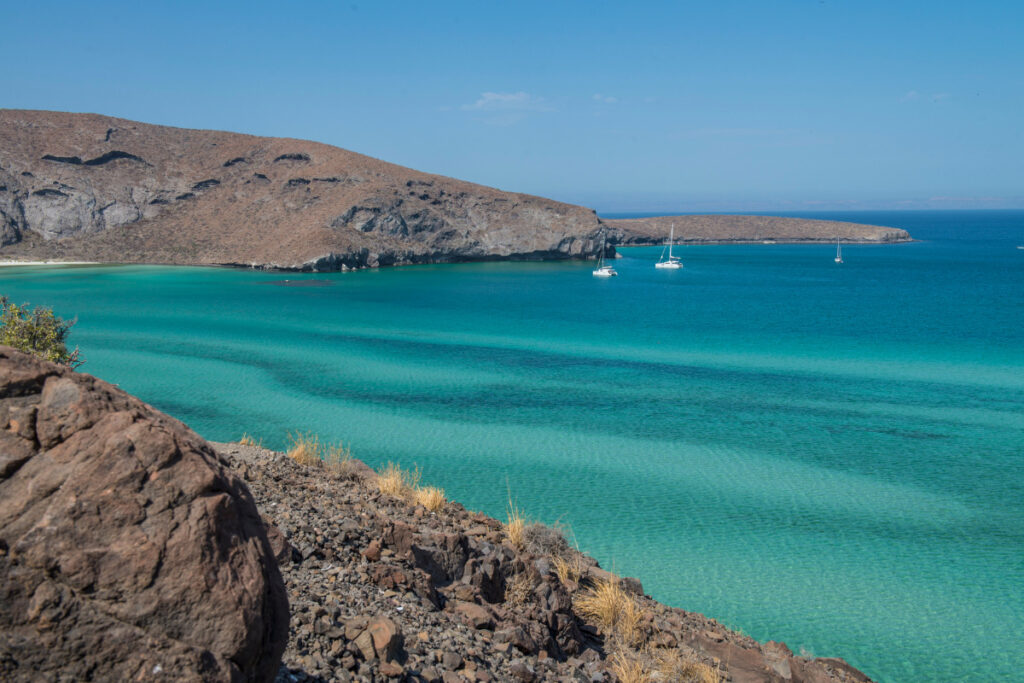
Baja Mexico is the peninsula directly below California. Bordered by the Pacific Ocean to the West and the Gulf of California to the East which separates it from mainland Mexico. A large majority of the peninsula is desert.
1000 miles from the US border to the Southern tip is Cabo San Lucas. There is a lot of beautiful coastline down both sides of the Baja peninsula (perfect for RVing!).
Sharing a border with California makes Baja very popular for travelers. Many ex-pats have homes here so you are likely to interact with Americans and Canadians in your travels.
Being so popular with Americans, there is lots of US influence here and English is more widely used than in other locations.
Baja is a safe place to travel and might be more comfortable for those nervous about traveling in Mexico due to the American influence there. The border cities of Tijuana and Mexicali are large, busy cities that like most border cities have a higher rate of crime. Most people choose to cross the border and just pass through to a quieter location for overnighting.
What is the Best Route Down the Baja Peninsula?
You will have two options for traveling South on the Baja California peninsula after crossing the border: highway 1 through Tijuana or highway 5 through Mexicali.
Highway 1 is the main highway so it has more traffic including large truck traffic and passes through a few busy cities South of the border. Good for amenities and pitstops but busy and more navigating required.
Highway 5 bypasses all of the busy spots and runs along the gulf side for approximately 250 miles and then connects to highway 1. This route has less traffic but also fewer amenities (like gas stations). For people uncomfortable traveling in more isolated areas, this route may not be for you.
Along the main highway in Baja, you will see the Green Angels. This is basically Mexico’s AAA. The Green Angels have trucks equipped to provide repairs from flat tires and dead batteries to minor engine and mechanical repairs.
How Can I Legally Protect Myself in an RV in Mexico?
Should you require legal assistance or representation in Mexico, you will need someone licensed to practice law in Mexico. Legal advice may come from your current lawyer or a lawyer in your country of residence however any legal action will require a Licensed Mexican lawyer.
There are lots of English-speaking lawyers who deal exclusively with non-citizens. Online forums can provide you with recommendations from your fellow countrymen.
Your countries embassy will also have a list of lawyers in Mexico that you can contact. If your plan is to be in Mexico for an extended period you could contact a lawyer prior to travel so the connections have already been made.
In terms of physical protection, know that it is illegal to bring firearms and weapons into Mexico.
5 Reasons to Avoid RVing in Mexico
RVing in Mexico is a fun way to see a beautiful country and experience a different culture. That being said, it isn’t for everyone. Here are five reasons why RVing in Mexico might not be for you.
1) Driving Conditions
This is a big one and anyone who has driven in Mexico will agree. One thing you always hear is, do not drive at night!
This is true but not because of banditos, it’s because of road conditions and animals. It is not uncommon to come across a large unmarked hole in a road or a rockslide that hasn’t been cleared. Topes are large speed bumps that are often unmarked that can cause damage or loss of control. They are all over the place and sometimes in unsuspecting places.
Farm animals roam free in much of Mexico and they all seem to gather on the warm asphalt at night.
Not all roads are in bad shape and there are some nice highways to travel but even the maintained roads are narrow and many without shoulders or guard rails. This can be nerve-wracking while driving or towing an RV.
2) Being Scammed
Some people will picture being blocked on a road and having your RV stolen leaving you alone in a desert. While this can happen as it can anywhere in the world, it is unlikely.
The much more likely thing is you will be scammed at a gas station or tricked into leaving a bag or valuable unattended. Being situationally aware is your best defense.
3) Availability of Things
Part of your planning pre-trip should include buying possible things you will or may need. Parts for your RV will not be as easy to access in Mexico especially in a rural area. A breakdown may mean waiting days or weeks to get something you need.
Many of your favorite things won’t be available and although not a trip stopper, it may be a big deal to you going weeks or months without it.
4) Law Enforcment Corruption
Yes, this is an issue in Mexico. Mexican police are paid very modest salaries and although it’s no excuse, it does lead to fishing for extra.
If you’re pulled over by a Federale with a large gun and no English vocabulary, the situation can be stressful. This is where some Spanish comes in handy. Although widely accepted, it is illegal to bribe police and it is encouraged to ask for your ticket and pay it when and where needed (usually the police station).
Many people choose to carry a small number of pesos to smooth over the situation by paying a reduced on-the-spot payment. Keep in mind some police will try and get you to pay them directly but this is by no means an armed robbery, stand your ground and make them write your ticket.
5) Getting Lost
Nobody likes getting lost but getting lost in an unfamiliar country can be even more stressful. Signage can be lacking, roads that are on a map are no longer there, or you misunderstood someone’s Spanish directions. There are lots of ways to get lost in Mexico and when traveling in a large RV or towing it can be stressful, to say the least.
There are many places with no cell signal so don’t rely on that. Have downloaded maps, a Mexico-specific GPS, or an old fashion road map.
It’s worth mentioning again that a little Spanish can help in this situation.
Conclusion
Mexico is a great country with lots to offer. The year-round good weather makes it great for RVing. Beautiful coastal drives, tacos, and camping on the beach scream epic road trip!
RVing in Mexico takes some planning and consideration. Hopping in your RV and heading to Mexico on a whim may not be the best idea. Personal safety is a priority regardless of where you are traveling so take the steps to ensure you are safe and can enjoy your trip!
About the author…
Jennifer and Kendall are avid RVers and part-time van lifers who share their years of experience both as full-time RVers and nomads through writing.
Jenn and Kendall have explored Canada, the USA, and Mexico while RVing and living full-time in all 3 countries.
They have been fortunate to work not only as part of the RVBlogger team but also with RVLife, DIY RV, Camper Report, RV Magazine, Rootless Living, Vanlifers, and more.
They have also shared their RV experience through DashboardDrifters.com and are the founders of RVSpotDrop, a web service for full-time RVers.



Very informative and helpful! My husband and I are healthy, athletic 65 year olds. We plan to move to MX. He is a world traveler and thinks I will feel safer in Baja. My son lives on the OR coast so we want to travel safely annually to visit.
We were leaning toward an RV like yours but also looking at the vans. We have not owned either. After watching this, it seems the van may be more appropriate.
I just hope we can cope in such a tiny vehicle! Any thoughts?